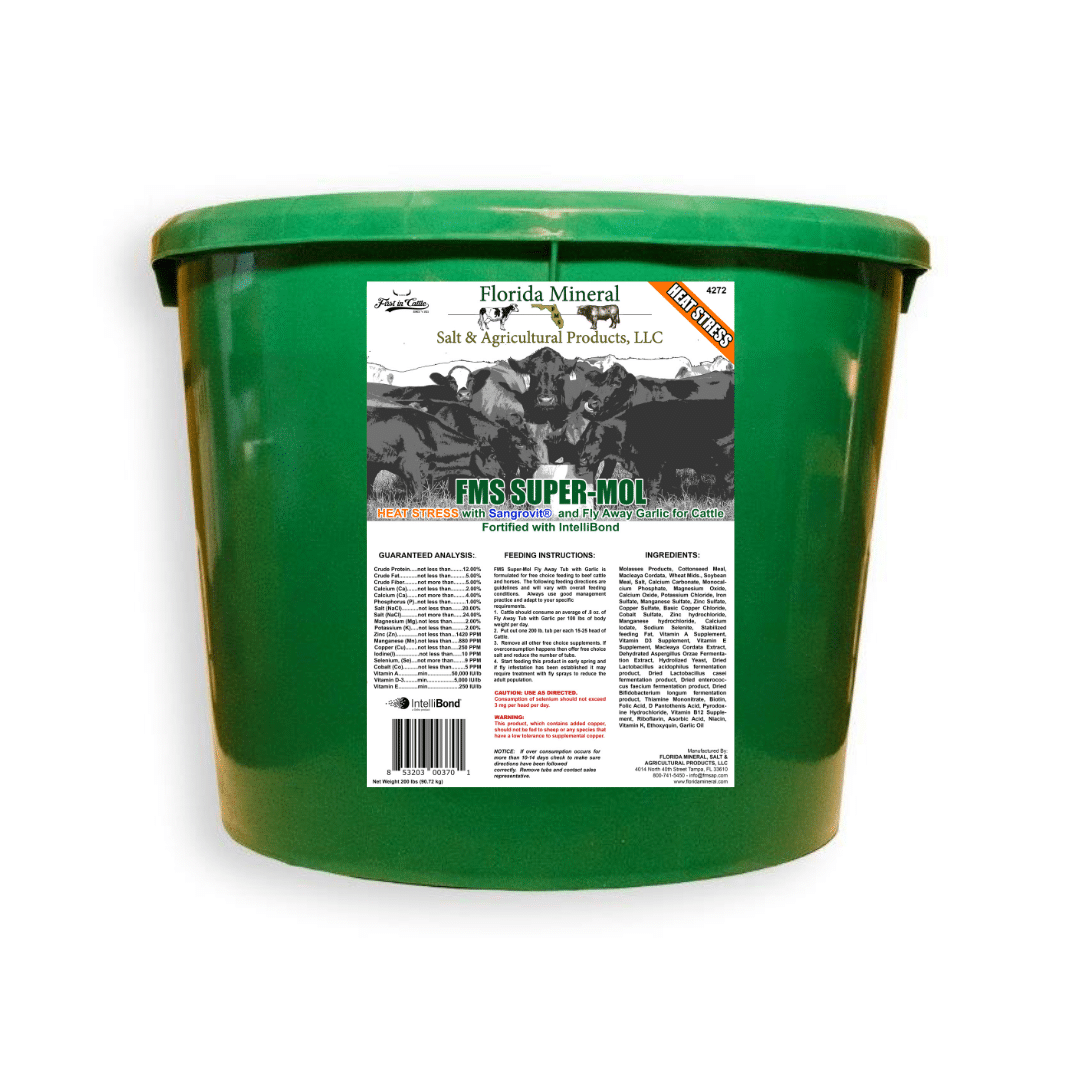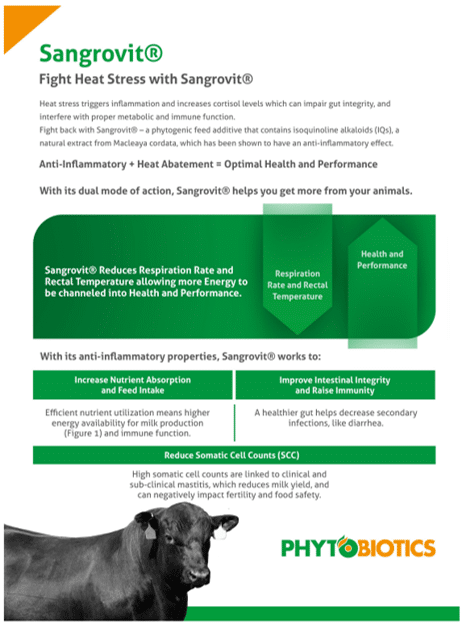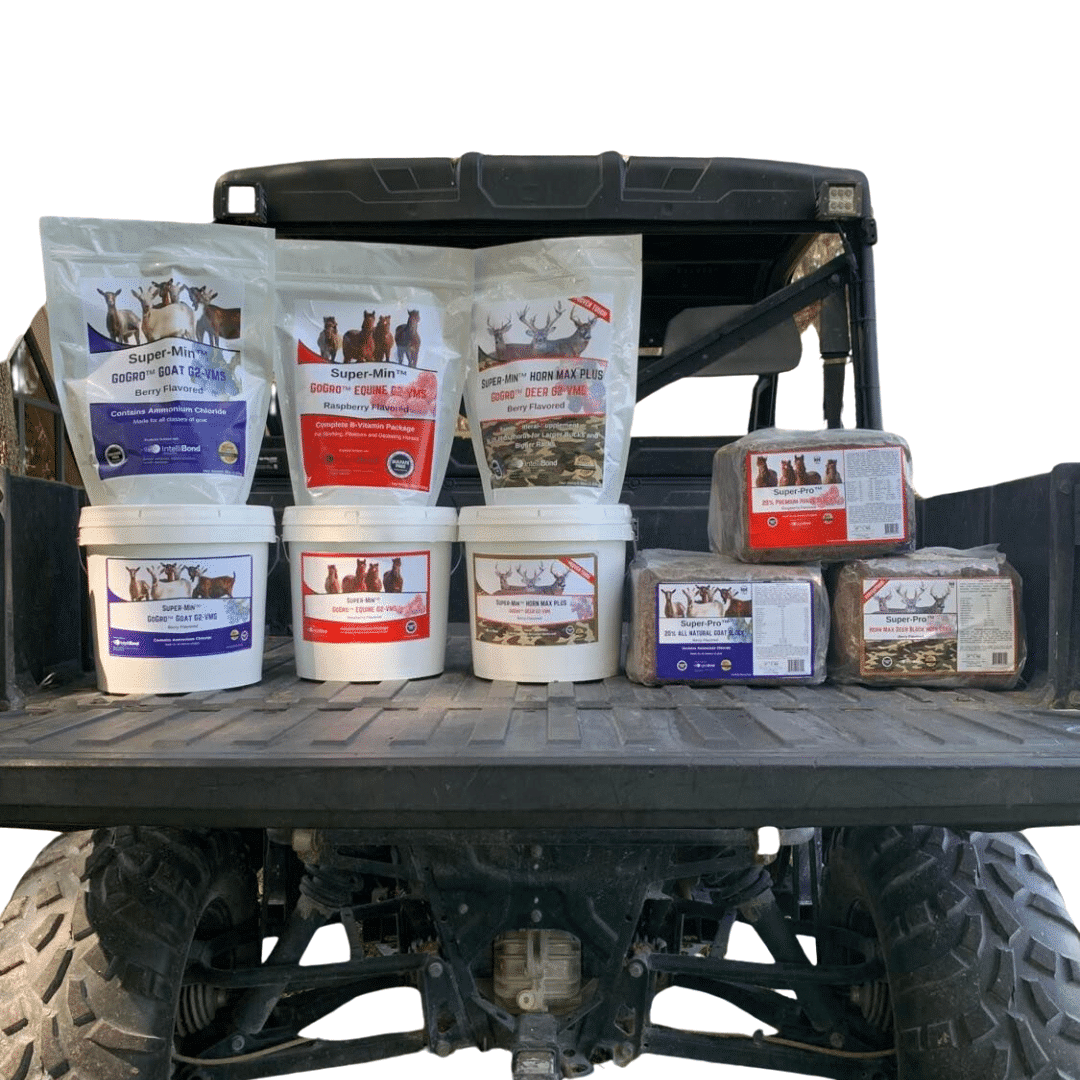Super-Mol Heat Stress Tub with Sangrovit® and Fly Away Garlic for Cattle (200lb tub)
Super-Mol Heat Stress Tub with Sangrovit® and Fly Away Garlic for Cattle (200lb tub)
Couldn't load pickup availability
Share
Super-Mol Heat Stress Tub with Sangrovit® and FlyAway Garlic for Cattle (200lb tub)
Heat Stress occurs when cattle cannot cool themselves effectively. Heat stress results in reduced feed intake, decreased milk production, reduced fertility, increased susceptibility to diseases, and even death.
FMS Super-Mol Heat Stress Cattle Tub with Fly Away Garlic is fortified with Sangrovit®, which increases Nutrient Absorption and Feed Intake, supporting Intestinal Integrity and Increasing Immunity. Scientific data has shown that reducing Respiratory Rate and Rectal Temperature, under heat stress conditions, allows more energy to be channeled into Health and Performance.
Heat stress in cattle refers to the physiological and behavioral responses that occur when cattle are exposed to high temperatures and/or high humidity levels that exceed their thermoneutral zone. Cattle are more prone to heat stress because they are less efficient at dissipating body heat compared to some other animals. Heat stress can occur in both dairy and beef cattle, and it can have significant negative impacts on their health, well-being, and productivity.

Sangrovit® is a phytogenic feed additive that supports the animal during heat stress so it can better respond to environmental stressors. Sangrovit® contains Isoquinoline alkaloids (IQs), a natural extract from Macleaya cordata, which has been shown for more than 20 years to have an anti-inflammatory effect that supports gut health by promoting feed intake and supporting the digestibility of nutrients.
In addition, a study at the University of Melbourne, Australia, showed a reduction in respiration rate and rectal temperature in animals supplemented with Sangrovit®, which allowed energy to be channeled into health and performance rather than combating the effects of heat.
Benefits of Sangrovit®:
- Increases Nutrient Absorption
- Increases Feed Intake
- Improves Intestinal Integrity
- Increases Immunity
- Reduces Somatic Cell Counts (SCC)
- Improves welfare, due to the reduction of cortisol, a stress hormone
- Provides more energy to use for performance and gut health, instead of fighting against disease or stress
Animals remain calmer and more focused on eating and drinking rather than combating stress. By using Sangrovit®, cattle have a better chance to fight against the stress caused by the increase in temperature.
To mitigate heat stress in cattle, various management strategies can be employed, including providing shade and access to cool, clean water, ensuring proper ventilation in housing facilities, adjusting feeding schedules to cooler times of the day, and implementing sprinkler systems or fans to aid in cooling. Additionally, nutritional interventions such as providing heat stress minerals and adjusting the diet to maintain electrolyte balance can help alleviate the impacts of heat stress on cattle.
Heat stress minerals play a vital role in supporting the health and productivity of cattle during periods of elevated temperatures. Here are some benefits of heat stress minerals for cattle:
- Electrolyte Balance: Heat stress causes excessive sweating in cattle, leading to the loss of essential minerals and electrolytes like sodium, potassium, and magnesium. Heat stress minerals help replenish these electrolytes, maintaining proper balance and preventing dehydration.
- Temperature Regulation: Heat stress minerals aid in thermoregulation by supporting normal bodily functions. For instance, minerals like selenium and copper are involved in enzymatic reactions that help regulate body temperature.
- Improved Water Intake: Heat stress can reduce water consumption in cattle, leading to dehydration. Certain heat stress minerals, such as sodium chloride (salt), enhance the palatability of water, encouraging increased intake and preventing dehydration.
- Enhanced Immune Function: Heat stress can compromise the immune system of cattle, making them more susceptible to diseases. Minerals like zinc, copper, and selenium are crucial for immune function, and ensuring adequate intake can help bolster the immune response and overall health.
- Reproductive Performance: Heat stress can adversely affect the reproductive performance of cattle. Minerals such as zinc, manganese, and selenium play important roles in reproductive processes, including conception, fetal development, and sperm production. Providing these minerals can support reproductive efficiency, even in hot conditions.
- Heat Tolerance: Some heat stress minerals, such as chromium, have been suggested to improve heat tolerance in cattle. While the exact mechanisms are still being studied, it is believed that these minerals help modulate stress responses, reducing the negative impacts of heat stress.
- Overall Health and Performance: Heat stress minerals contribute to the overall health and well-being of cattle, which, in turn, positively impact productivity. By supporting various physiological functions, including metabolism, enzyme systems, and antioxidant defenses, these minerals help maintain optimal performance even under heat stress conditions.
It’s important to note that specific mineral requirements may vary depending on factors such as breed, age, body weight, and the severity of heat stress. Consulting with a veterinarian or an animal nutritionist can help determine the appropriate heat stress mineral supplementation for your cattle, considering their specific needs and environmental conditions.
And Don't Forget the Fly Away Garlic
Garlic is often suggested as a natural deterrent for flies and other insects that bother livestock. Garlic contains a compound called allicin, which is believed to have insect-repellent properties. When consumed, the odor from garlic can be excreted through the skin, sweat, and breath, creating a scent that some insects, including flies, find unpleasant. Allicin is a compound that is found in garlic (Allium sativum). It is responsible for the distinct aroma and flavor of garlic. When garlic is crushed, chopped, or otherwise damaged, an enzyme called alliinase converts a precursor compound called alliin into allicin. Allicin is volatile and quickly decomposes into other compounds, which is why the pungent smell of garlic dissipates over time. While some farmers and ranchers claim that garlic has helped reduce fly populations around their cattle, there is no consensus in the scientific community regarding its effectiveness. Flies can be a nuisance to livestock and can potentially transmit diseases, so it’s crucial to implement reliable fly control measures. Below are links to studies supporting garlic as a natural fly control product.
It’s important to consider that relying solely on garlic as a fly deterrent may not provide complete control over fly populations. Implementing comprehensive fly control strategies, such as good sanitation practices, proper manure management, fly traps, and insecticides approved for livestock use, may be necessary for more effective fly control.
Click on the links below to learn more about the power of Garlic.
- Availability: CALL TO ORDER
PRODUCT INGREDIENTS
Molasses Products, Cottonseed Meal, Macleaya Cordata, Wheat Mids., Soybean Meal, Salt, Calcium Carbonate, Monocalcium Phosphate, Magnesium Oxide, Calcium Oxide, Potassium Chloride, Iron Sulfate, Manganese Sulfate, Zinc Sulfate, Copper Sulfate, Basic Copper Chloride, Cobalt Sulfate, Zinc hydrochloride, Manganese hydrochloride, Calcium Iodate, Sodium Selenite, Stabilized feeding Fat, Vitamin A Supplement, Vitamin D3 Supplement, Vitamin E Supplement, Macleaya Cordata Extract, Dehydrated Aspergillus Orzae Fermentation Extract, Hydrolized Yeast, Dried Lactobacillus acidophilus fermentation product, Dried Lactobacillus casei fermentation product, Dried enterococcus faecium fermentation product, Dried Bifidobacterium longum fermentation product, Thiamine Mononitrate, Biotin, Folic Acid, D Pantothenis Acid, Pyrodoxine Hydrochloride, Vitamin B12 Supplement, Riboflavin, Asorbic Acid, Niacin, Vitamin K, Ethoxyquin, Garlic Oil
PRODUCT DIRECTIONS
FMS Super-Mol Fly Away Tub with Garlic is formulated for free choice feeding to beef cattle and horses. The following feeding directions are guidelines and will vary with overall feeding conditions. Always use good management practice and adapt to your specific
requirements.
- Cattle should consume an average of .8 oz. of Fly Away Tub with Garlic per 100 lbs of body weight per day.
- Put out one 200 lb. tub per each 15-25 head of Cattle.
- Remove all other free choice supplements. If overconsumption happens then offer free choice salt and reduce the number of tubs.
- Start feeding this product in early spring and if fly infestation has been established it may require treatment with fly sprays to reduce the adult population.


- Choosing a selection results in a full page refresh.
- Opens in a new window.


